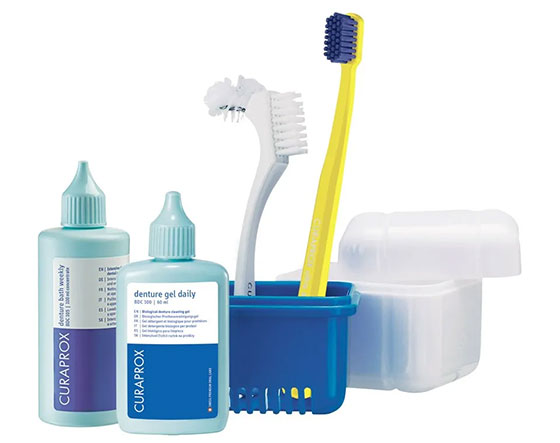Denture Care
Taking care of Dentures
It is essential to avoid using toothpaste on dentures, as it can create scratches and lead to discolouration. Instead, opt for a denture brush, which is softer and specifically designed to clean dentures without causing damage.
When cleaning dentures, never use bleach or boiling water. Bleach can discolour the pink acrylic, while hot water may distort the shape of the dentures.
When handling partial dentures, take care not to bend the clasps, and always be cautious to prevent dropping them, as this could result in fractures.

It is crucial to refrain from using department store glue to repair dentures. Such adhesives contain harmful chemicals that should never come into contact with the mouth. When not in use, store dentures in water to prevent them from drying out.
There are various denture cleaning solutions available, including tablets and powders that can be mixed with water in a denture bath. We recommend using NovaDent Denture Cleaner and Renew Denture Cleaner for optimal results.
Cleaning dentures at home is straightforward, but daily oral hygiene is vital to prevent plaque, food debris, and calculus buildup. Neglecting this can lead to sore spots, unpleasant odours, and complicate denture cleaning. Mineral deposits from saliva can accumulate on the surface of dentures, so maintaining a consistent cleaning routine is essential. When dentures are crafted, the base is smoothed and polished to minimise food and plaque accumulation. If you notice that your dentures have lost their smoothness or shine, it’s advisable to visit a denture clinic for cleaning and polishing.
Dentures should be removed at night to allow the gums to rest, just like the rest of the body. Continuous wear without giving the gums a chance to “breathe” can lead to infections of the soft tissues beneath the dentures.
When dentures are not in use, they should be kept in water or a denture solution to maintain moisture and prevent them from drying out and losing their shape. Avoid soaking or rinsing dentures in boiling water, as this can permanently distort their fit. Additionally, do not soak them in bleach, as this will discolour the acrylic.
After meals, rinse dentures under room temperature water to eliminate food debris. Regular brushing is recommended after each meal or at least before bedtime to remove plaque and stains. Use room temperature water and denture cleaner for brushing. If denture cleaner is unavailable, mild soap can be used, but avoid toothpaste or abrasive cleaners, as they can scratch the denture surface. Scratches increase the likelihood of debris, plaque, and stains accumulating.
You may use a denture brush, but ensure you have a separate brush for cleaning any natural teeth. Always clean dentures over a towel or a basin of water to prevent breakage if they are dropped. When handling lower dentures, hold them in the middle rather than squeezing the ends to avoid fractures.
Never attempt to scrape hard deposits, such as calculus or mineral buildup, off the denture with sharp instruments. Instead, schedule an appointment with your dentist to have the buildup removed and the denture polished. Special care should also be taken when cleaning around denture clasps to avoid bending them.
